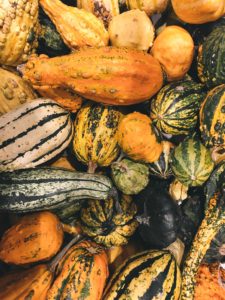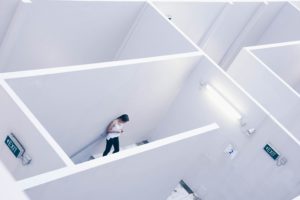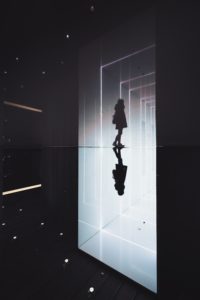by Jenny Rose | Nov 23, 2017 | Choice, Power
Last week, I explored the meaning and experience of anxiety. In doing so, I realized that all my anxiety has a common root in scarcity, which gave me the subject for this week’s post. Scarcity and abundance. What could be more perfect for Thanksgiving week?
Scarcity, according to a quick Internet search, is “the state of being in short supply; especially want of provisions for the support of life; unlimited wants in a world of limited resources.”
In spite of the fact that I come from a middle-class background, I’ve always lived with the bony specter of scarcity. As a child, I constantly feared there wasn’t enough, even though there was enough. We always had a home, and food, and clothing. The house was full of books and music. We had pets. We had cars. We even took vacations, a thing I was certainly never able to do with my own children. Still, I was always afraid we’d run out of money. The worst thing I could imagine was not being able to afford to feed and care for the animals! I was continually waiting for it all to disappear.
My insecurity around physical resource was not the biggest anxiety producer. What really ensnared me was emotional scarcity. It never seemed to me there was enough love, or patience, or joy. There wasn’t enough time, enough energy, enough hope. My feeling of emotional hunger led me to conclude that the problem was me. I was greedy and selfish. I wanted too much.
Most painful of all was my belief that I wasn’t enough. Not smart enough, not strong enough, not quick enough, not wise enough, not loving enough, not adult enough. I could see no cure for my inadequacies, no hope that I could ever be fixed, and, employing the heartbreaking logic of children, my conclusion was I didn’t deserve anything but scarcity.
Unsurprisingly, my experience since I formed that belief has been of scarcity on every level.
It’s important to note that in some significant ways this frame of scarcity has been useful. I don’t have “unlimited wants,” for example. In fact, I’ll rarely admit to wanting anything at all, which is a problem on the other end of the spectrum. I’ve never enjoyed shopping. I’m a reluctant consumer. I don’t long for gems or cruises, fine wines, luxury cars or elegant homes.
Living with restricted financial resource has taught me a lot about the limited power of money. What I value and want most, as well as what I most want to contribute, can’t be bought or sold. I’ve also learned unfulfilled wanting and longing can be lived with.
On the other hand, living from a position of scarcity has not only kept my anxiety fat and happy, it’s impoverished my courage, my ability to love, and my self-confidence. My belief in scarcity has sucked away a lot of my power.

Photo by Brigitte Tohm on Unsplash
What about abundance? Abundance is “a very large quantity of something; plentifulness of the good things of life; prosperity.”
When I started thinking about anxiety in the last couple of weeks, I began to notice its presence or absence during activities of my daily life. For example, when I deal with household needs and wants, bills, the grocery list, and think about jobs, I feel anxious. When I’m out walking, gathering cones, cutting greens for holiday wreaths, collecting the beautiful little Sensitive fern pods for crafting, I feel no anxiety and have no experience of scarcity. The fields, the woods, the river, the trees, the fall bracken and naked branches and twigs all speak to me of plenty, and plenty, and plenty again. Abundance is everywhere. There is enough. I am enough.
I wrote last week about my suspicion that my anxiety is a bad habit as much as anything. I wasn’t consciously choosing to haul around such a dreadful burden, but dredging it up from my subconscious into the daylight, specifically defining it and shining a light on it, allowed me to realize I don’t have to allow anxiety to run me. I can choose to disengage with it.
What if the frames of abundance and scarcity are also choices? What if I decide scarcity is no longer a useful label for my experience or self-definition, and I choose instead to believe in enough, or even in more than enough? Imagine it. Enough resources. Enough water and silence and time. An abundance of arms strong enough to hold me through the deepest hours of the night. A river of tenderness. A roomful of dancers. A strong, resourceful, wise, creative self.

Photo by Roderico Y. Díaz on Unsplash
Abundance is everywhere I look this morning, in the glowing wood stove, in the cartons of eggs stacked in the refrigerator, in boxes of wreaths I’m loading into the car to take to my friend’s farm store. Abundance is in writing these words, and when I glance from them I see, out the window, the infinite beauty of the November landscape.
It’s also true that we’re nearly out of bacon, and I know there are other items on the current grocery list. We’re heading into winter and haven’t been able to fix the leaky roof, but I suppose one could say there’s more roof than hole, so that’s a good thing!
Isn’t it really all just a cosmic balance? We can’t possibly take in everything at once in life, so we narrow our focus, and invariably find what we’re looking for. Changing our focus changes what we see. Perhaps abundance has always been hand-in-hand with scarcity and I’ve just never looked beyond what I knew and expected. How can these two concepts be separated? They make each other possible.
My anxiety is currently sulking and on a starvation diet. Scarcity is what it thrives on, but I’m kind of bored with that tired old goblin. I’m enjoying my new focus and filter of abundance. I like the way it makes me feel. It doesn’t make all the challenges go away, but it certainly balances them with a peaceful, satisfied feeling of enough, and I’m grateful.
It’s Thanksgiving Day as I post this. I wish everyone the abundance of the season in food, loved ones and joy.
All content on this site ©2017
Jennifer Rose
except where otherwise noted
by Jenny Rose | Apr 27, 2017 | Connection & Community, Emotional Intelligence
I noticed last week’s post on authentic female power quickly became my most read post to date, perhaps confirming my suspicion about how hungry women are to reclaim real power.
This week, my partner shared a short video clip with me that talks about manufactured consent.
This morning, as we cooked breakfast together, My partner informed me about the new trend of buying dirty jeans at $425 a pair.

Photo by Andrew Loke on Unsplash
As usual, I feel painfully out of step with the culture. I feel angry. I feel lonely. I feel flawed in some deep, irrevocable way because of what I want. I grieve for the loss of connection with what I can touch, smell, taste, look at, hear and be held by.
Yet there was a significant response to last week’s post, which indicates to me I’m not as alone as I feel.
It seems to me we’re increasingly distanced from one another, increasingly divided. The culture says we’re more connected and have access to more information than ever, and in a manner of speaking that’s true. We’re more technologically connected than ever. We’re more connected with word and symbol than ever. In fact, our heightened connectivity is creating new languages of emojis, emoticons, like and dislike buttons, and shortcut language that accommodates the limitations of tweets and texts.
Yet we live in technological enclaves that are every bit as rigid as physical neighborhoods and districts in a city. If, like me, we don’t have a cell phone — well, we’re out of the texting conversation. We’re invisible. We don’t count. We’re silenced. Ditto if we don’t have access to Internet or aren’t on social media, or don’t have an email. If we don’t play on the technological playground, we’re depersonalized and disconnected — literally.
But words, pictures, profiles and emoticons can lie. Language includes communication that only occurs with physical presence. Without physical presence, we can’t discern lies from truth. Our power is so damaged we routinely swallow just about everything the culture, media, advertising and our “friends” tells us.
For example, professional women can’t succeed if they don’t adhere to social standards of businesslike attire, clothing and makeup. If you don’t believe me, look it up on any of your tech devices. It’s not hard to find this “fact,” both directly stated and implied. Let me just repeat that, to make sure you got it.
If we’re a woman who doesn’t buy and use makeup, we can’t succeed in the business world. Everybody says so. Everybody believes it. Everybody makes it true by enforcing it each and every day with words, buying choices, advertising, blogs and articles, all courtesy of technological connectivity and manufactured consent. In 2015, the United States was considered the most valuable beauty and personal care market in the world, with a market value of 80 billion dollars.
I’d say that’s pretty successful manufactured consent, wouldn’t you? Pat yourself on the back if you wear makeup, because your hard-earned money is somewhere in that 80 billion dollars. Well done. Do you feel successful and powerful now? Someone does.
If we’re on Facebook, we have friends, a community, a popular vote of “likes.” We don’t have to deal with morning breath, a wet spot on the mattress, different schedules and rhythms, dirty bathrooms, greasy stoves, or any of the small idiosyncrasies and habits real people have. We don’t have to reveal our physical bodies, our insecurities and our wounds. The worst rejection we risk is being blocked or unfriended. We don’t have to learn how to accept, live with and perhaps even appreciate (perish the thought!) different points of view or opinions. We don’t have to be challenged, stretched, or have our dearest beliefs threatened.
Pressing a button is so much easier than all the messy consequences of authentic connection.

Photo by Alessio Lin on Unsplash
We never have to risk being real at a technological remove. No one can blow our cover. We never have to face ourselves; take responsibility for our words, views or choices; or endure the difference between the way we wish to be and the way others actually experience us. Or, alternatively, we can come out of hiding, feel safe behind the screen, and finally allow all our hate and rage off the leash.
Our culture tells us power and success equal carefully constructed pseudo self profiles, the latest technological gadgets, social media accounts, likes, followers and “friends.”
The culture teaches that power and success are achieved by buying things and the possession of money. Now there’s a circular game of empty addiction we can never win and sellers never lose!
Power and success are ours if we participate fully in manufactured consent. Would anyone like to buy a pair of dirty jeans? Guaranteed power and success!
Yet how many of us truly feel powerful and successful? Are we there yet? If we’re not there, we will be after we buy just one more thing, right? Or perhaps we need to make just a little more money, or lose a little more weight, or finally find the “right” mate.
If we’re well connected technologically, our needs are all met, yes? We have a tribe, a community in which to laugh, cry, celebrate, mourn and share our authentic selves. We have physical reassurance and bonding. Our relationships are based on authenticity, reciprocity and respect. We feel seen, heard and known.

Photo by freddie marriage on Unsplash
I don’t think so. I don’t think tech meets all our needs for authentic connection. I think it more often swallows us up and absorbs us. It’s a toxic mimic for the real thing, more controllable and less risky, and we the sheeple have been groomed to buy every toy that’s put in front of us. We’ve forgotten to look up and notice there’s another human being in the room, in the bed or at the table. That’s the power of manufactured consent.
It doesn’t surprise me that Baba Yaga spoke to so many last week. We’ve sterilized what she represents right out of our modern culture. All her outrageous, provocative, profane, rebellious, insubordinate, irreverent, passionate, authentic attributes have been pushed underground, where her spirit lurks, watching, cackling, stirring her cauldron, sucking on bones and waiting for us to remember her and summon authentic power and connection again.
Authentic connection has a scent of living tissue and breath. It’s texture and heartbeat. It communicates with word, action, and the silent language of the body. It doesn’t allow us to shut our eyes, stop our ears or press a button and dismiss uncomfortable tension.
Authentic connection reveals us to ourselves and to others. It isn’t muffled, sterilized or distorted by keyboard or touchpad. It’s defined by visible action and choice. It demands priority and time. It requires real participation, with heart, body and presence. Authentic connection makes us weep. It makes us bleed. It makes us laugh. It awakens our rage. It heals us and makes us whole. It’s messy, unpredictable, confusing, demanding, imperfect, and reminds us at every turn of the limits of our power. It forces us to communicate and then holds us accountable for what we say — and what we don’t.
Most of all, authentic connection is not something we can buy — ever. No one and nothing can give it to us. Our only access to it is through ourselves. We’re a nation of prostitutes, viewing, clicking, scrolling, buying and surfing, but the only ones profiting are the pimps who cash in on our hunger for something real and our addiction to everything not-real.
Yet Baba Yaga is on the move, sowing seeds of divine rebellion into the cancer of manufactured consent and patriarchy, deprogramming one woman at a time. Even now she’s flying on the spring wind in her mortar, using a pestle as a rudder, searching for all those women who long for something real.
Searching for me.
My daily crime.
All content on this site ©2017
Jennifer Rose
except where otherwise noted




